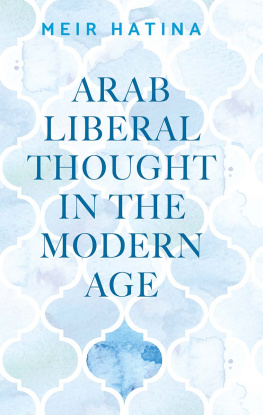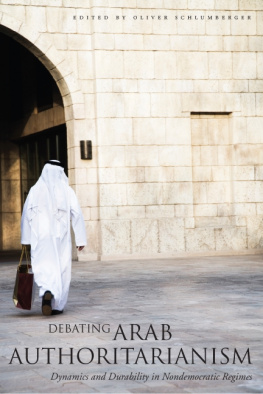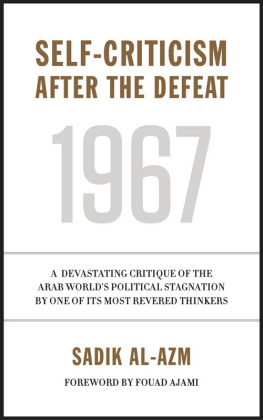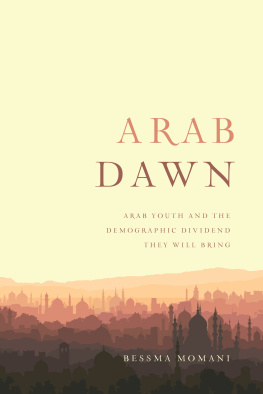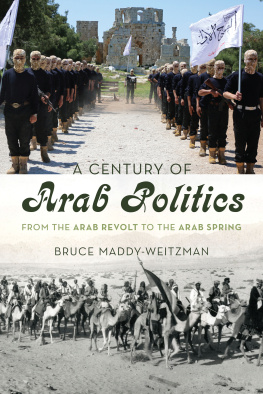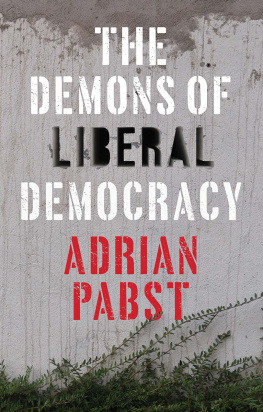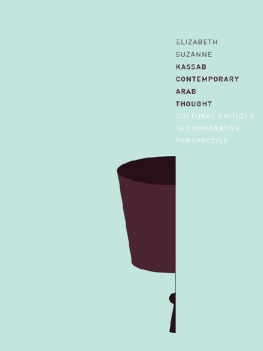Arab liberal thought in the modern age
Arab liberal thought in the modern age
Meir Hatina
Manchester University Press
Copyright Meir Hatina 2020
The right of Meir Hatina to be identified as the author of this work has been asserted by him in accordance with the Copyright, Designs and Patents Act 1988.
Published by Manchester University Press
Altrincham Street, Manchester M1 7JA
www.manchesteruniversitypress.co.uk
British Library Cataloguing-in-Publication Data
A catalogue record for this book is available from the British Library
ISBN 978 1 5261 4291 7 hardback
First published 2020
The publisher has no responsibility for the persistence or accuracy of URLs for any external or third-party internet websites referred to in this book, and does not guarantee that any content on such websites is, or will remain, accurate or appropriate.
Typeset by
Servis Filmsetting Ltd, Stockport, Cheshire
To my son,
Ariel,
the light of my life
Intellectuals, regardless of their political affiliation, are the guardians of values and their protectors. Their permanent place is in the ranks of the opposition in its broadest sense.
Nasr Hamid Abu Zayd, Mashru al-Nahda byna Talfiqiyyat al-Tabaqa
wal-Turth al-Islami, al-Muhit al-Thaqafi 5 (March 2002), p. 71.
Contents
The English transliteration of Arabic words follows standard academic rules as stipulated by the International Journal of Middle East Studies. Arabic names and terms used in the English-language literature appear in their English version. However, I have at times used the North African transcription of names, such as Mohamed Talbi, Abdelmajid Charfi, Mohammed Abed al-Jabri, and Fatima Mernissi. This applies also to Persian transcriptions, such as Mohsen Kadivar, Seyyed Hossein Nasr, and Abdulkarim Soroush.
For the sake of convenience, and in order to make this volume more accessible to non-specialist readers, diacritical marks and macrons for long vowels have not been used in the main text. Arabic terms and names are italicized, except for those that recur often, such as ulama, mufti, fatwa, hadith, sharia, and jihad. The letter ayn is represented by and hamza by . Anglicized place and corporate names are given in their familiar form (Cairo, Baghdad, Tehran), and dates are given according to the Western calendar.
All translations of Quranic verses are those of M. A. S. Abdel Haleem, The Quran: A New Translation (Oxford: Oxford University Press, 2004), with occasional, slight alterations. Verses are cited follow the numbering of the common Egyptian edition. Unless otherwise indicated, all other translations from Arabic are my own.
The research literature has tended to overlook Middle Eastern liberalism in favor of more powerful and assertive forces embodied by centralist regimes and Islamic movements. The present study, focusing on the post-1967 era, fleshes out a vivid and intriguing record of Arab liberalism, which, although lacking a compelling civic and political infrastructure or even organized knowledge bodies (such as publishing houses), nevertheless endured over time, remaining an active agent in the public sphere. Arab liberalisms contribution to a culture of political pluralism has been twofold: ratifying the right to dissent and questioning the Arab status quo.
I am indebted to a number of institutions, as well as to colleagues who assisted me in the process of preparing this volume. The research was made possible by a generous grant from the Israel Science Foundation (ISF). An earlier draft of the work was completed while I was a visiting scholar at St. Antonys College, University of Oxford in 2015. I remain deeply grateful to Professor Eugene Rogen, director of the Middle East Centre, for offering me a stimulating environment in which to pursue my research. Other Centre fellows, notably Walter Armbrust, Avi Shlaim, and Michael Willis, offered valuable and insightful observations.
My deepest appreciation also goes to the following mentors and colleagues for their assistance, advice, and critiques: Muhammad al-Atawneh, Meir Bar-Asher, Israel Gershoni, Meir Litvak, Jakob Skovgaard-Petersen, Emmanuel Sivan, Itzchak Weismann, and Mira Tzoreff. I wish to thank the four anonymous referees for their expertise and insightful comments about the manuscript. Thanks are also due to Yona Sheffer and Or Pitusi, who helped locate and collect important material, and to Belina Neuberger, who skillfully edited the book. I am deeply grateful to the editorial staff at Manchester University Press, particularly Robert Byron, Lianne Slavin, and Andrew Kirk, for their invaluable professional guidance. Finally, I embrace my wife Ilana and my son, Ariel, who was born and grew up while I was writing this book.
Meir Hatina
Introduction
Debating Arab liberalism
This research, focusing on post-1967 Arab liberal thought, has two purposes: to shed light on a relatively ignored ideology or narrative in the research literature and public discourse, and hence to do historical justice to its spokespersons. Indeed, while Arab liberal thought found it hard to gain momentum during this period, it nevertheless remained a constant part of the intellectual tradition in the Arab region. It continued to display ideological viability, contributed to the public debate on cultural, social, and political issues, triggered debates against its adversaries and recruited new adherents, especially among former leftists. New information technologies, mainly satellite communications and the Internet, clearly acted as facilitators, while also creating transnational spaces between the Arab world and the West. Shared experiences connected liberal writers from different regions in which key issues high on the Arab and Middle East agenda were discussed, questioning the Arab status quo and advocating alternative visions for local societies.
Arab liberal debates on freedom of religion, secularism, individualism, democracy, and human rights meant more than a mere rethinking of Islamic tradition and Arab political culture; it led to the formulation of a liberal enterprise, or even theology oriented toward action, seeking to enact an Arab enlightenment.
Defining liberalism
Liberalism and civic culture go hand in hand in modern political thought. They emerged as a reaction to absolute power, and intended to create the basis for a fair and just society. The liberal current was well integrated into the parliamentary nation-state that emerged in the nineteenth and twentieth centuries. Humankinds centrality in the universe and the liberty of human beings are sacred values in liberal thought. Its building blocks are individualism (the individual and his or her needs are at its center), rationalism (utilitarian considerations as the basis for human decisions), personal and civic freedom, political pluralism, and universalism (equality of human life regardless of religion, race, or gender). On the spectrum of individual liberties, religious liberty and the separation of Church and state are central. The state is responsible for safeguarding religious freedom by means of a constitutional system founded on the principle of individual autonomy and the right to choose ones faith. From this perspective, respect for religious freedom is not respect for religion per se, but respect for the freedom of choice it represents, as part of the exercise of individual autonomy. Side by side with liberty is the principle of equality. Liberals speak of equality in two senses: equality before the law and equality that springs from being born equal, as members of the human race. However, liberalism has never waved the banner of economic equality, which conflicts with its belief in property rights and a free market, and its opposition to economic interventionism.

